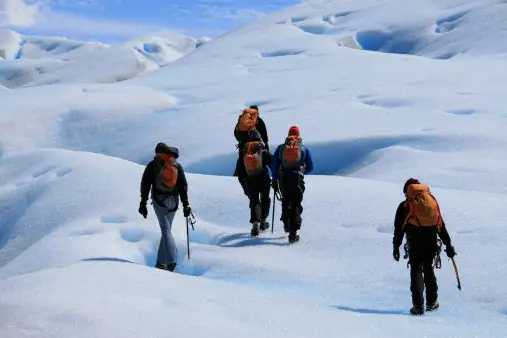Next month, British explorer Sam Cox will spend two months, completely alone, trekking across one of the Earth’s last true wildernesses – Antarctica.
While travelling 2,000km across snow and ice requires a huge amount of physical endurance, the mental impacts of this journey are perhaps, even more significant.
Alexandra de Carvalho from the Austrian Space Forum will be working closely with Sam pre- and post-expedition, to understand the psychological impacts of the journey.
“The first thing to consider is the sheer isolation of this challenge. Two months with extremely minimal human contact is not something to be underestimated,” she said.
“Our work is mainly concerned with space, and people usually think that space is more distant than Antarctica, but actually it’s not true. It’s much easier sometimes to come back from space, to come back to Earth if there’s an emergency.
“More people have gone into space than trekked to the South Pole.
“To come back to the mainland from Antarctica can be extremely difficult, which exacerbates that feeling of distance. You cannot just be evacuated if you want.”
The only link Sam will have to the outside world is a beacon plotting his incremental location in case of emergency, and very limited communications via satphone.
Alexandra added: “Separated from family and friends, this kind of study will help to really understand more about the psychology of people.
“In fact, this is the main reason we were so keen to work with Sam. He’s in a very special situation, being alone with nobody to share his feelings with, nobody to share his thoughts with.
“It’s rare that scientists can study subjects that are completely isolated for this amount of time, let alone in conditions as extreme as those in Antarctica.
“We really want to get an idea how a person emotionally regulates in this kind of scenario.”
Sam will be taking daily voice recordings of the experiences and emotions he’s feeling during this period of extreme isolation.
Alexandra said: “For this research to be useful, it’s really important that we hear frequent and specific audio diary entries from Sam.
“It’s common for people to look back on an experience like this and say – it was stressful, but it was nice – which is not precise enough for us.
“We’re using audio equipment to make this as accessible for Sam as possible – writing could be a challenge in extremely low temperatures.
“In similar studies, we’ve asked participants to keep written diaries as the fear of being overheard by other participants might stunt their honestly, but that’s not going to be an issue with Sam, since he’ll be completely alone.”
There will be other psychological challenges for Sam, as well as isolation.
Sam said: “An important thing to consider is the 24-hour daylight, and how my body will adapt to that.
“Because I’m travelling during Antarctica’s summer months, the sun will never actually set, meaning my circadian rhythm is likely to get pretty confused.
“A lack of sleep could be detrimental to my physical and mental well-being, so it’s something I’m having to prepare for.”
Alexandra said: “Sensory deprivation could also be a challenge. It’s an interesting environment, but it’s very monotonous, so it depends on the person and how they perceive it.
“For example, Sam might find it interesting to have the colour green. While other people would be fascinated by the sky and the sea, he might be like wow – I really miss the forest and more complex environments.”
Alexandra continued: “This research is not only helping us understand the emotional impact of extreme environments, but it’s helping us understand the type of person that’s suitable for working in these remote places.
“We want to know how people feel in these environments, which emotions are more dominant? How do these people deal with that?
“When people are stationed in distant locations, either from Earth or in polar expeditions, they have to be really trained to deal with their feelings autonomously.
“But we can only do that by understanding when happens within a person and what they’re likely to feel so we can prepare them beforehand. You can prepare, but you cannot run away from your emotions.”
Sam leaves the UK for Antarctica on 24th October, with plans to complete the expedition by mid-January.
He has been supported by Team Forces and Resilient Nutrition to embark on this epic adventure.
For more information, follow Sam on www.frozendagger.co.uk

